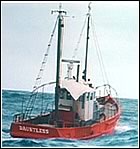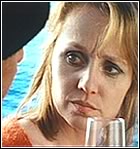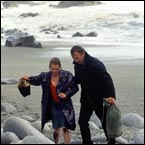Written and directed by Gaylene Preston
Cast: Rachael Blake, Sam Neill, Joel Tobeck
Genre: part adventure story, part thriller

Written and directed by Gaylene Preston Cast: Rachael Blake, Sam Neill, Joel Tobeck Genre: part adventure story, part thriller |
 |
 |
 |
 |
 |
Fush out of water ... Rachael Blake puts in a strong performance
as a shanghaied sheila all at sea with a madman in New Zealand. Sam Neill moves in on Rachael Blake, having correctly identified her as the most attractive person in the room; she reciprocates by saying she likes his shoes, and he tells her he bought them in Italy. Then, with the pleasantries out of the way, it's: "My place or yours?" It turns out to be his - a fishing boat moored nearby - where things suddenly slow down as she passes out under the influence of yet more champagne. When she comes to, it's morning, she has a hangover and certain differences of approach have become glaringly obvious. While she thought she was getting into a one-night stand, her date has decided he's in love and he's going to hold on to her until she can be persuaded to feel the same way. Perfect Strangers is a small film with big ideas. Preston calls it a macabre fairytale about "the mythology of romance". And so it is. It's also supremely silly on a scale films achieve only when they're left fumbling for a tone supple enough to enable them to rise to their ambitions. But as Neill and Blake head out into the blue, with her cursing him for many things, including the fact she hates the outdoors, you're buoyed by a promising set-up, along with two leads who incline you to hope for the best. They make a psychologically persuasive combination - Blake, with her husky voice and slutty glamour, and Neill, displaying the slightly old-world charm that explains why he keeps getting called upon to play boffins, naval officers and the kind of husbands who lose their wives to the likes of Harvey Keitel. He lands the boat on an island, deserted but for an old fishing shack, while lowering clouds crank up the atmosphere by enhancing the already unsettling effects of black cliffs and volcanic rock crags. The New Zealand landscape is justly celebrated for its ability to suggest a catastrophe around every corner, and Preston is giving due warning that she's about to exploit it for everything it's got. As for the story, Neill's character, who, for mystery's sake, is never given a name, has convinced himself he's rescuing Blake's good-time girl, Melanie, from a lifetime spent with the wrong people. And in return, he expects her to make herself nice in line with his view of desirable behaviour in a woman. It's a more courtly variation on the themes explored by John Fowles in The Collector, together with a host of kidnap stories since. There is one difference, however. This time, the abductor has picked the wrong target, for Melanie is much tougher than he is. But just as you're settling down to the enticing prospect of a full program of sexual power games, Preston abruptly junks psychology for Gothic action. By the time we've got back to the boat for a climactic storm, Melanie, the nature-hating city girl, has exchanged her stilettos for boots and metamorphosed into Superwoman-on-Sea. She's also half-mad, and Blake battles hard to make the Antipodean matter-of-factness of her line deliveries jibe with the operatic effects swirling around her. In the interests of the plot, I won't say what's happening to Neill - except that events don't exactly encourage his expressive side. At this point, we're only midway. Still to come are some broad strokes of gallows humour so at odds with what's gone before that they make your head spin. Thrills, tragedy, fantasy, farce - Preston wants you to have it all. But despite the heroism of Blake's performance, the story just can't take the weight. Reviewed by Sandra Hall, SMH, October 9, 2003 http://www.smh.com.au/articles/2003/10/08/1065601907530.html
|
|||||
Once Upon a Time, back in the seventies when women began to get their hands on movie cameras again, there was this desire to tell it like it really is. Women were many other things besides glossy and admiring objects of male fantasy; they were ready to break out of the narrow roles to which post-war filmmaking had consigned them. The apron-clad Debbie Reynolds and Ava Gardner vamps were discarded. There was ground to make up, and a world to explore. Cinderella snorted, put on Doc Martens and went out to find a better-paying job. When she could afford them, she acquired a briefcase, a good suit and her own mortgage. Almost the last world to explore was that of the psyche. Female lust could be admitted, but the dark and dangerous impulses – the attraction to dangerous men, the wish for revenge - never. When women killed it was for self-defence, or to sacrifice themselves for another. What no one could account for was the surprising persistence of female fantasies of falling in love. The dream of perfect union, perfect fulfilment, and living happily ever after. There’s a very interesting group of films which I think is beginning to address this puzzle. Let's call them the 'anti-romance' films. In France, filmmakers like Catherine Breillat who made Romance and then A Ma Soeur have turned their attention to the female psyche. In English-speaking cinema, Jane Campion was among the first of the post-seventies feminists to peer into the sometimes perverse female psyche. Sweetie admitted female narcissism, repression and the fiercest of sibling rivalries; The Piano explored such things as woman’s protest directed against her own body; sex as subversion, sex as currency, sex for curiosity. Campion’s heroines were always, in their own ways, lustful. Some of these anti-romance films use genre to make their points. Virginie Despentes’s Baise-Moi used a splatter version of the road movie to rework the 'rape and revenge' genre which, fashioned by men, has usually combined titillation with high moral ground (see, for example, Shekar Kapur’s Bandit Queen. Baise-Moi shocked because it exploited the sex and violence conflation most women refuse because it’s usually directed at us. But in this film, pace Godard, the girls had the guns. In The Cut, releasing here next month, is Jane Campion’s most explicit film, yet about the craving which will lead a woman to seek out sex with a man she distrusts and even fears. She has compromised the ending, and that’s a pity; but the critics who misread it as a suspenseless thriller fail to see that it's about sex first and fear second. Female desire that is. Who was it said 'Perfect love casts out fear'? Maybe it should be female fantasy. Some anti-romance films employ fantasy in the most matter-of-fact register. Claire Denis’s Vendredi Soir is an encounter between a woman stuck in a monumental Parisian traffic jam, and a male stranger who gets into her car. She spends the night with him, and their courtship dance is delicate and fraught as it always is. In the morning she walks away to her new life without a backward look. Now there is Gaylene Preston’s Perfect Strangers in some ways the wildest anti-romance of all. Preston is an accomplished New Zealand director whose last three features have played out on a social canvas. This film is different. The heroine is Melanie, and she’s played by Rachael Blake in a performance which fulfils – exceeds - all the promise she showed in Lantana Melanie is not a good girl. She’s wanton, and she’s bored. She works in a fish and chip shop in a small town on the wild West Coast of New Zealand. And she can have her pick of any of the men at the local pub. One Friday night she meets the perfect stranger there at the pub. He’s tall dark, handsome and unusually well mannered. He's played by Sam Neill. 'Your place or mine?' he asks. 'Yours,' she says, 'I already know mine.' In the morning she wakes up to find herself at sea. He’s sailed her away to her own little island...and he knows all about her. This film addresses a situation every women dreads and most at some time have experienced. What do you do when you find yourself in this kind of danger? If you want to live, do you fight, or do you submit? But that’s only the start of the story. Perfect Strangers is a wild combination of thriller and fable. It plays with our expectations of the handsome prince fairy story, and the stalker story as well. It has a great deal to say about the craving for love, and its wellsprings. 'Falling in love,' says Preston, 'is to fall into a kind of madness.' I cannot tell you more about the story. But I can guarantee this film will suprise you. It confirms Rachael Blake as a magnificent actor, and Gaylene Preston as a filmmaker at the height of her powers. Reviewed by Julie Rigg http://www.abc.net.au/rn/arts/sunmorn/stories/s965854.htm
|
|||||
|
Melanie, Rachael Blake, lives alone in a small city on New Zealand's South Island; she works in a fish and chip shop and, on Saturday nights, she goes drinking with her friends, hoping to find a man. On this particular night she meets a stranger, Sam Neill, who offers to take her back to his place. Gaylene Preston's very accomplished film skillfully plays with genre expectations. It starts out like a thriller in which a vulnerable woman apparently makes the fatal mistake of going off with a man she doesn't know, but a series of twists and turns, plus an unexpectedly mordant sense of humour, keep the audience guessing. Rachael Blake, so wonderful in Lantana, gives another superb performance
here, intelligent and touching, while Sam Neill successfully combines
charm and menace as the stranger who changes Melanie's life. It's virtually
a two-hander, though a third character appears late in the day, and the
other star of the film is the landscape, the wintry west coast of the
South Island which is so evocatively photographed by Alun Bollinger. Perfect
Strangers is one of the best films to come from New Zealand in recent
years.
|
||||
Wellington director Gaylene Preston told an Australian interviewer that "if you haven't had your heart broken, you won't get this movie". It's a cheeky challenge which implies that if the film doesn't work, the fault lies with the audience. But plenty of viewers with extensive experience of heartbreak won't buy it. They may just wonder why half of the film doesn't make sense and the other half is deliriously, defiantly silly. The best things about the film are its tantalising title - suggestive and neatly ambiguous - and its West Coast setting. Preston, who comes from that neck of the woods, has an unerring feel for it and the raw, sea-raked landscapes are magnificently lensed by cinematographer Alun Bollinger, who shot Heavenly Creatures for Peter Jackson and Vigil for Vincent Ward. But the film as a whole is a studied exercise in frustration which puts you in mind of the old crack about Wagner's music not being as bad as it sounds. Perfect Strangers is simply nowhere near as good as it looks. Blake, Neill (in his first film here since The Piano) and Tobeck strive mightily to keep the whole leaky enterprise afloat but it founders and ultimately capsizes under its own weight. Blake, last seen as the other woman in Lantana, plays Melanie, who works in a smalltown fish-and-chip shop. She spends her lunchbreaks filling out the quizzes in women's magazines and her evenings at the pub, looking, none too hopefully, for something or someone to take her away from all this. One night out drinking, she meets a tall, dark stranger (Neill's character, in one of the film's many forced touches, never has a name other than "The Man"). She answers his question "Your place or mine?" with a weary "Yours. I've seen my place." His place turns out to be a boat, on which she passes out after too much champagne and awakes to find herself out of sight of land. It gives little away to say that he's abducted her, having conceived an instant, obsessive infatuation with her which he is sure she will reciprocate in time. So far, so freaky. But Preston, who is working from her own screenplay, so cannot share the blame around, has far weirder things in mind. A colleague who told me he really wanted someone to explain the story to him put his finger on the film's major flaw, its impenetrability. The obvious answer is that this is a sort of metaphysical thriller - the end hints as much, but it's really just a cop-out and a cliche - which doesn't have to conform to the rules of naturalistic narrative. Dimly one detects a proudly perverse, post-feminist agenda but it's hard for a film to maintain an audience's allegiance when it keeps raising more questions than it answers. Perfect Strangers strives for a tone it cannot sustain because it's littered with irritating non-sequiturs: the couple arrive on an island in the morning and Melanie's instantly in a candle-lit bath at night; a deep puncture wound is laboriously stitched; when the contents of a meat freezer are found spread over the ground, the owner doesn't look in the freezer; a woman's sudden, heroic command of seamanship doesn't prevent her from leaving the wheelhouse during a massive storm; people wade across a bay to a boat which is tied up at a jetty; even the old classic of the shipwreck survivor with instantly dry clothes gets an outing. Melanie oscillates wildly between treating The Man like the psycho he obviously is and some sort of cuddly teddy-bear or an expensive hooker's client with kinky tastes. Meanwhile a dramatic fight ends with the combatants dozing off! The Film Production Fund, bending its own rules, exempted this film from the requirement to raise 40 per cent of the budget from foreign financiers. As a result it was funded entirely from the public purse. Rivals whose projects languish in development hell feel aggrieved, and not without cause: they will not be the only ones to wonder whether this was money well spent. Reviewed by PETER CALDER, NZ Herald, 31.01.2004 (Herald rating: * *) http://www.nzherald.co.nz/entertainment/
|
|||||
Two years ago, Ray Lawrence's Lantana impressed everyone with its intelligent perspective on the complexities of contemporary life. One of the standout performances came from Rachael Blake, who immediately crossed the Tasman to play the lead role in Perfect Strangers, opposite Sam Neill, making his first appearance in a New Zealand film for many years. Perfect Strangers is very different to Lantana, but it digs just as deep and it will appeal to a similar audience. Part adventure story, part thriller, it challenges the romantic fantasies that have been woven into our storytelling for centuries. Melanie appears to be a reasonably happy young woman, self-contained and unattached. But she's looking for something. She goes drinking regularly with her workmates, trawling the bars and checking out the available men. There's never anyone special, until one night a stranger catches her eye… As the night unravels, he starts to look more promising and he's obviously open to offers. Melanie's journey begins casually enough, though a more cautious person might have hesitated. But perhaps she's in love with the idea of falling in love. Gaylene Preston: "… the fantastic sort of fantasy that goes on around falling in love. I reckon falling in love is one of the scariest things that everybody does." Writer-director Gaylene Preston encourages us to anticipate her story and to wonder how far Melanie is prepared to go. The audience is always getting what they want in Perfect Strangers and, a millisecond later, wondering why they wanted it. Melanie wakes up the morning after in the hold of the man's boat. It's a frightening moment, quickly defused when he greets her warmly and offers her champagne. Perhaps it's not an abduction, but the start of a great adventure. But the landscape becomes a character in the story when they arrive at a remote island. It's wilder and more primitive than anything Melanie has experienced and nothing she's done before has prepared her for this. Gaylene Preston: "There's the romantic prince who's kind of a bit cracked. We have the cracked princess who has a mind of her own but she's not really, she's got all this autonomy which she doesn't necessarily know what to do with…" And instead of a castle, she finds a humble fisherman's hut. Rachael Blake: "I was so, as Rachael, I was so dismayed when I saw it. I thought, is this where this character ends up? In this asbestos shack? Oh, my God, it just… I was really hoping it would be a beautiful little house and I could go, actually he's not that round-the-bend at all and he's got a really nice place. But it didn't. It was a dump." Gaylene Preston has made a number of feature films and ambitious documentaries, but Perfect Strangers is the closest she's come to her own origins on the rugged west coast of New Zealand's south island. Sam Neill: "There's nothing quite like New Zealand. It's a sort of saturated place, full of spirituality and oddity." Sam Neill enjoyed being home again, but it was the quality of the script that attracted him. Sam Neill: "It is, I suppose, at the end of the day, a kind of scary, scary romance. Those things seem kind of opposing and an impossible mismatch, but that's what's so intriguing about the story, I think." As the balance of power shifts, we're constantly tempted to think we know where the story is headed. But Perfect Strangers is deliberately playing with our hopes and expectations. Rachael Blake: "I don't think it's till, until you're in danger or there's elements of risk that we find out who we are, and it's through what we risk that we find out our personal boundaries and who we are, our personal credo, and I think that's what Melanie does." Gaylene Preston: "Perfect Strangers, in a nutshell, is about the dangerous deception of desire. That's what it's about. And I guess it's for the broken-hearted. If you haven't had your heart broken, you won't get this movie, but if you've had your heart broken and you like a modern fairytale, then there's plenty to chew on." This is one of the most intriguing films to appear in a long time — richly romantic, perplexing and ultimately asking more questions than it answers. The performances from Rachael Blake, Sam Neill and Joel Tobeck are superb and the photography by veteran Alun Bollinger equally so. But it's Gaylene Preston's tough-minded, imaginative direction that creates the framework and it's the way she challenges our preconceptions that will keep you wondering long after you leave the cinema. Don't miss it. Reviewed by: Peter Thompson, October 5, 2003
|
|||||
Perfect Strangers, the new thriller by Kiwi filmmaker Gaylene Preston starring Sam Neill opens in New Zealand this week following a deluge of international acclaim. Set in a small town on the South Island's beautiful and savage West Coast, Perfect Strangers tells the story of a woman named Melanie (Rachel Blake - Lantana) who meets a handsome stranger (Sam Neill - Sleeping Dogs, Jurassic Park) at the local pub. Charmed by him, she agrees to return with him to his "castle" - a rundown shack on a deserted island. But after a series of events, she realises she has been kidnapped. Torn between fear and desire, Melanie must escape - but her admirer has other plans. Joel Tobeck (Chanelling Baby), Madeline Sami (Shortland Street) and Robyn Malcolm (Mercy Peak) co-star in the film. Preston describes her film as a "macabre fairy tale". "I suppose you could say it is the quintessential 'man alone' story turned around on itself," she says. "It is most scary when drippingly romantic, and it has it's tongue firmly in it's cheek. It sets out to debunk romantic myths, but only by bending well accepted story conventions to become something new and confrontational." Preston considers the West Coast locations integral to the feel of the film. "There is a fourth character in the movie - the location. The treacherous beauty of the wilderness, the way the rain falls, the sea pounds, the clouds move, all reflect the protagonists' moods, their exultation and their deepest fears." Perfect Strangers has received overwhelmingly positive international reviews. David Stratton from Hollywood bible Variety described the film as an "intriguing, virtually unclassifiable romantic thriller fantasy" and calls it "one of the best films to come from New Zealand in recent years." The Sunday Telegraph's Paul Le Petit said "Gaylene Preston has produced a little gem here, a film of great atmosphere using its actors to the full." And Vicky Roach of The Daily Telegraph calls it a "macabre romance played with chilling conviction by its handsome leads." Preston made her film debut with the classic kiwi chiller Mr Wrong in 1985, and has since directed the acclaimed true-life drama Bread & Roses and the documentary War Stories Our Mother Never Told Us. Feb 05, 2004 http://onenews.nzoom.com/onenews_detail/0,1227,253419-1-455,00.html |
|||||